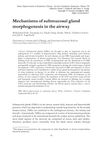 29 citations,
July 2013 in “The Journal of Sexual Medicine”
29 citations,
July 2013 in “The Journal of Sexual Medicine” Testing for CAG repeat polymorphism in the androgen receptor gene is not currently recommended for managing hypogonadism.
 26 citations,
May 2012 in “Cellular and Molecular Life Sciences”
26 citations,
May 2012 in “Cellular and Molecular Life Sciences” NcoA4 may have roles beyond helping control gene activity, possibly affecting cell behavior and stability.
 20 citations,
May 2011 in “Cancer Biology & Therapy”
20 citations,
May 2011 in “Cancer Biology & Therapy” Finasteride may improve prostate cancer treatment outcomes.
 11 citations,
August 2009 in “Expert Opinion on Drug Discovery”
11 citations,
August 2009 in “Expert Opinion on Drug Discovery” We need better ways to test and understand SARMs to make safer and more effective treatments.
29 citations,
June 2020 in “International Journal of Molecular Sciences” Notch signaling disruptions can cause various skin diseases.
 146 citations,
January 2004 in “Hormones”
146 citations,
January 2004 in “Hormones” Human skin acts like a hormone-producing organ, making and managing various hormones important for skin and hair health.
 101 citations,
April 1994 in “Baillière's clinical endocrinology and metabolism”
101 citations,
April 1994 in “Baillière's clinical endocrinology and metabolism” 5α-reductase is essential for male sexual development and its inhibitors have potential in treating various conditions related to hormone action.

Cornification is the process where living skin cells die to create a protective barrier, and problems with it can cause skin diseases.
 21 citations,
March 2019 in “Critical Reviews in Clinical Laboratory Sciences”
21 citations,
March 2019 in “Critical Reviews in Clinical Laboratory Sciences” The androgen receptor is a promising target for breast cancer treatment, especially in triple-negative cases, but more research is needed for personalized therapies.
90 citations,
February 2001 in “The journal of investigative dermatology/Journal of investigative dermatology” Interleukin-1 increases keratin K6 production in skin cells.
 9 citations,
December 2002 in “Novartis Foundation Symposium”
9 citations,
December 2002 in “Novartis Foundation Symposium” LEF1 is essential for the development of airway glands and is regulated by the Wnt/ß-catenin pathway.
 1 citations,
January 2022 in “Journal of Biosciences and Medicines”
1 citations,
January 2022 in “Journal of Biosciences and Medicines” Understanding how androgens and their receptors work can lead to improved treatments for skin diseases.
 1533 citations,
October 2008 in “Endocrine reviews”
1533 citations,
October 2008 in “Endocrine reviews” Mice without the vitamin D receptor have bone issues and other health problems, suggesting vitamin D is important for preventing various diseases in humans.
 18 citations,
March 2002 in “The journal of investigative dermatology/Journal of investigative dermatology”
18 citations,
March 2002 in “The journal of investigative dermatology/Journal of investigative dermatology” Estrogen increases blood vessel growth factor production, while testosterone blocks this increase.
 July 2022 in “medRxiv (Cold Spring Harbor Laboratory)”
July 2022 in “medRxiv (Cold Spring Harbor Laboratory)” Satoyoshi syndrome is likely an autoimmune disease that mainly affects young women and improves with immune-related treatments.
3 citations,
July 2023 in “Frontiers in Aging” Hair follicle stem cells change states with age, affecting hair growth and aging.
 1 citations,
March 2024 in “Science”
1 citations,
March 2024 in “Science” Vitamin A helps skin stem cells decide their function, aiding in hair growth and wound repair.
 100 citations,
September 2017 in “Molecular and Cellular Endocrinology”
100 citations,
September 2017 in “Molecular and Cellular Endocrinology” Male hormones and their receptors play a key role in hair loss and skin health, with potential new treatments being explored.
 15 citations,
July 2017 in “Hormones”
15 citations,
July 2017 in “Hormones” Genetic defects in the glucocorticoid receptor gene can cause conditions with abnormal sensitivity to stress hormones, and other factors may also affect this sensitivity.
 1 citations,
July 2016 in “Elsevier eBooks”
1 citations,
July 2016 in “Elsevier eBooks” Understanding skin structure and development helps diagnose and treat skin disorders.
 51 citations,
February 2009 in “Journal of dermatological science”
51 citations,
February 2009 in “Journal of dermatological science” Pitx2 helps outer root sheath cells differentiate but can't start hair growth on its own.
 3 citations,
November 2015 in “Journal of Investigative Dermatology”
3 citations,
November 2015 in “Journal of Investigative Dermatology” Testosterone can both promote hair growth and cause baldness by affecting hair growth signals.
 1 citations,
September 2013 in “Elsevier eBooks”
1 citations,
September 2013 in “Elsevier eBooks” Hair ages and thins due to factors like inflammation and stress, and treatments like antioxidants and hormones might improve hair health.
 68 citations,
December 2014 in “Cell Biochemistry and Function”
68 citations,
December 2014 in “Cell Biochemistry and Function” Nuclear hormone receptors play a significant role in skin wound healing and could lead to better treatment methods.
 479 citations,
January 2005 in “BioEssays”
479 citations,
January 2005 in “BioEssays” Hair follicle development is controlled by interactions between skin tissues and specific molecular signals.
 54 citations,
December 2007 in “Best Practice & Research Clinical Endocrinology & Metabolism”
54 citations,
December 2007 in “Best Practice & Research Clinical Endocrinology & Metabolism” Targeting glucocorticoid action might help treat type-2 diabetes, but human trials are needed.
 21 citations,
August 1994 in “Clinical endocrinology”
21 citations,
August 1994 in “Clinical endocrinology” 5α-Reductase inhibitors can help treat hair loss, acne, and prostate issues by reducing DHT levels.
219 citations,
January 2006 in “Drug Metabolism Reviews” DHEA affects multiple receptors and may help with metabolic issues, but its safety and effectiveness in humans are unclear.
 1066 citations,
March 2010 in “Nature Reviews Molecular Cell Biology”
1066 citations,
March 2010 in “Nature Reviews Molecular Cell Biology” MicroRNAs are crucial in controlling cell signaling, affecting cancer and tissue regeneration.
 May 2018 in “International journal of cell science & molecular biology”
May 2018 in “International journal of cell science & molecular biology” Early anti-aging hair treatments should focus on anti-inflammatory agents and promoting healthy hair growth cycles.

























